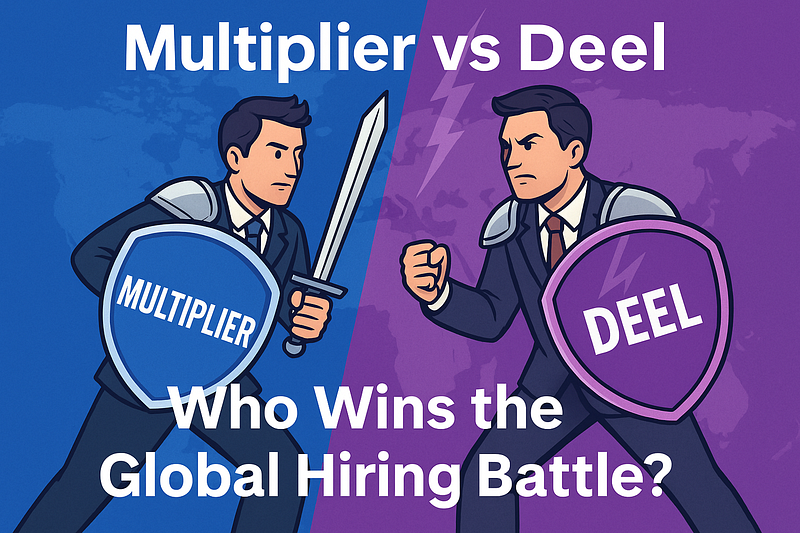Multiplier vs Deel: Which Global Hiring Platform Fits Your Business Best?
Growing your business across borders is a big step — and figuring out how to actually hire people overseas can be a major roadblock. You…

Growing your business across borders is a big step — and figuring out how to actually hire people overseas can be a major roadblock. You need more than just good intentions; you need a way to legally employ and pay your new team without opening offices in every country. Platforms like Multiplier and Deel can really change the game.
This guide dives deep into Multiplier vs Deel, comparing features, pricing, real-world use cases, customer reviews, and everything else you’d want to know before making a decision.
Quick Look: What Are Multiplier and Deel?
Multiplier launched in 2020 and is designed for companies that want to hire employees or contractors internationally, without getting buried in red tape. They keep it simple: fast onboarding, flat pricing, and essential services like local payroll, benefits, taxes, and visa support.
Deel, founded in 2019, also helps companies build international teams, but leans heavier into offering extras. In addition to hiring and payroll, Deel provides virtual cards, salary advances, loans, and full HRIS integrations, making it more of an end-to-end HR platform.
Both platforms solve the same core problem but take slightly different paths doing it.
Feature Breakdown: Where They Stand Apart
Both handle employment contracts, tax withholdings, leave tracking, and compliance checks behind the scenes. Multiplier is a streamlined “get-it-done” tool. Deel feels more like an HR command center.
Pricing: What’s the Real Cost?
If you’re trying to be smart with your hiring budget, pricing matters. Here’s the breakdown:
Multiplier
- $400 per employee/month
- $40 per contractor/month
- Flat pricing across countries
Deel
- $599 per employee/month
- $49 per contractor/month
- Free basic plan for managing contractors (no full HR features)
Multiplier is the clear winner if you want straightforward, affordable rates. Deel’s higher cost covers its additional features, but small to mid-size businesses might find it overkill unless they need everything Deel offers.
Heads up: Deel users sometimes report hidden fees, especially for certain payment methods or region-specific charges. Always check the fine print.
When Should You Use Multiplier or Deel?
Multiplier is a strong fit if:
- You’re scaling up quickly and want simplicity
- Budget matters — and you want predictable, flat rates
- You’re mainly looking for employment, payroll, and compliance
Deel is better suited if:
- You’re hiring dozens (or hundreds) of people globally
- You need a full HR system: onboarding, contracts, expense management, payroll, and perks
- You want financial tools like salary advances and virtual cards built into your system
Both platforms work well for:
- Hiring full-time employees without setting up a local entity
- Managing international freelancers and contractors
- Building distributed teams that need reliable pay and compliance
What Customers Are Actually Saying
Multiplier Feedback:
- Users love how quick and simple onboarding is.
- The support team gets high marks for responsiveness.
- A few customers mention minor invoicing or payment hiccups.
Deel Feedback:
- Users rave about Deel’s user experience and flexibility in payments.
- 24/7 customer support is a consistent highlight.
- Complaints mostly focus on extra fees and slow withdrawal processing in certain countries.
Overall, both platforms score between 4.5 and 4.8 out of 5 stars on top review sites like G2, Trustpilot, and Capterra.
Pros and Cons: Quickfire Summary
Multiplier Pros:
- Lower cost
- Rapid setup and onboarding
- Dedicated account managers
- Visa support and stock options included
- High data security standards
Multiplier Cons:
- Limited software integrations
- 24/5 (not 24/7) support
- Occasional payment setup delays reported
Deel Pros:
- Owned legal entities worldwide (better compliance)
- Rich HR and finance features
- Instant onboarding for contractors
- 24/7 live support
- Deep software integrations
Deel Cons:
- More expensive
- Potential extra transaction fees
- Some onboarding processes feel a bit heavy, especially for compliance checks
Core Differences to Know
- Cost Structure: Multiplier is flat and simple. Deel costs more but packs in extra features.
- Legal Coverage: Deel’s owned entities mean tighter compliance. Multiplier partners locally in some areas.
- Platform Scope: Multiplier is a pure EOR. Deel doubles as a full HR/finance ecosystem.
- Support: Deel gives you 24/7 access; Multiplier sticks to weekdays.
- Integrations: Deel wins for companies that already use big HR platforms like Workday, BambooHR, or QuickBooks.
Final Thoughts: Which One Should You Actually Pick?
Go with Multiplier if:
- You want cost-effective, simple hiring and payroll
- You’re a startup or mid-sized business aiming for speed
- You don’t need all the bells and whistles
Go with Deel if:
- You’re a larger organization hiring at scale
- You want a one-stop-shop for HR, payroll, and finance needs
- You can justify the extra cost for broader features
Bottom line: If you need a “just get it done” EOR platform, Multiplier is probably your best bet. If you’re building a global machine and want all the extras, Deel is worth the premium.
Before you decide, take a minute to map out your real needs — because the best platform isn’t just about features. It’s about fit.
Some of the links in this article are affiliate





